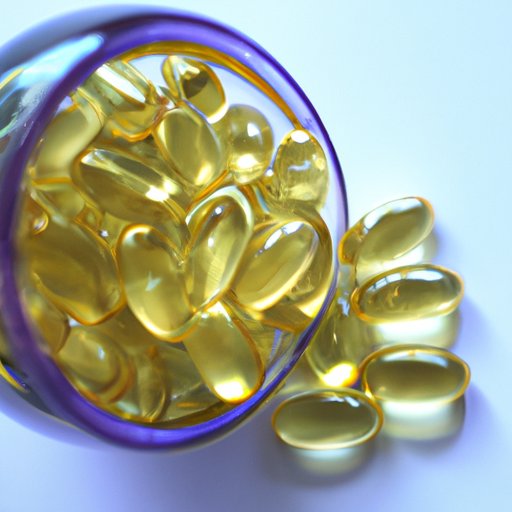
Introduction
Vitamin D is an essential nutrient for overall health and is particularly important for women. It plays a crucial role in bone health, immune function, and more. However, many women are deficient in this nutrient due to lack of sunlight exposure and poor dietary choices. This article will explore how much vitamin D a woman should take, its importance for female health, sources of this nutrient, and potential health benefits.
The Role of Vitamin D in Women’s Health
Vitamin D performs numerous functions in the body that are important for overall health. These include:
- Aiding in the absorption of calcium and phosphorus, which are necessary for strong bones and teeth.
- Regulating the immune system and reducing inflammation.
- Maintaining a healthy nervous system and brain function.
- Supporting lung function and cardiovascular health.
The recommended daily intake for women varies based on factors such as age, weight, and health status. In general, the National Institutes of Health recommends that adult women consume 600-800 IU of vitamin D per day.
Vitamin D levels can have a significant impact on overall health. Low levels of vitamin D have been linked to an increased risk of osteoporosis, depression, heart disease, and certain types of cancer.
Sources of Vitamin D for Women
There are two primary sources of vitamin D: diet and sunlight exposure. While some foods contain small amounts of vitamin D, most people obtain their vitamin D through exposure to sunlight.
The ideal amount of vitamin D from sunlight exposure varies depending on skin type, time of day, and location. In general, experts recommend spending 10-30 minutes outside during peak hours of sunshine (usually between 10 a.m. to 3 p.m.) a few times per week to get adequate vitamin D. For those who live in areas with limited sunlight, vitamin D supplementation may be necessary.
Dietary sources of vitamin D include fatty fish such as salmon, tuna, and mackerel, dairy products, and fortified foods such as cereal, orange juice, and milk. However, it can be difficult to obtain enough vitamin D from diet alone without supplementation, especially for those who follow a vegan or vegetarian diet.
Vitamin D for Women at Different Life Stages
Vitamin D needs for women vary based on age and life stage. For example:
- Teenage girls and young adult women need more vitamin D for bone development and maintenance.
- Pregnant and breastfeeding women require additional vitamin D to support fetal growth and breast milk production.
- Women over age 50 may need extra vitamin D to protect against osteoporosis.
During pregnancy, vitamin D intake is especially important as it helps to ensure proper fetal bone development and can reduce the risk of complications such as preeclampsia. Women who are pregnant or breastfeeding should discuss their vitamin D needs with their healthcare provider.
Health Benefits of Vitamin D
Vitamin D has numerous health benefits, including:
- Improving bone health and reducing the risk of fractures and osteoporosis.
- Boosting the immune system and reducing the risk of infectious diseases.
- Reducing inflammation and the risk of autoimmune diseases such as multiple sclerosis and psoriasis.
- Protecting against heart disease and reducing the risk of high blood pressure and type 2 diabetes.
- Promoting healthy brain function, including reducing the risk of depression and cognitive decline.
While more research is needed to fully understand the potential health benefits of vitamin D, it is clear that it plays an important role in overall health.
Getting Enough Vitamin D
For those who have difficulty obtaining enough vitamin D from sunlight and diet alone, supplementation may be necessary. Vitamin D supplements are available over-the-counter and come in varying strengths, including 1000 IU and 2000 IU. However, it is important not to exceed the recommended daily maximum of 4000 IU per day, as excessive amounts of vitamin D can be harmful.
In addition to supplements, individuals can optimize their vitamin D levels by choosing foods that are high in vitamin D, such as salmon, egg yolks, and fortified foods. Spending a small amount of time in the sun can also be helpful, but it is important to take precautions to avoid skin damage and sunburn, such as wearing protective clothing and using sunscreen.
Addressing Common Concerns about Vitamin D
While vitamin D is generally safe and beneficial, there are some potential concerns to keep in mind:
- Excessive vitamin D intake can lead to toxicity, which can cause a range of symptoms such as nausea, vomiting, and weakness. This is rare, but it is important to follow recommended guidelines for vitamin D supplementation.
- Increasing vitamin D intake can interfere with certain medications, such as corticosteroids and weight loss drugs.
- There is some debate about optimal vitamin D levels and how to measure them. However, most experts agree that maintaining a level of 30 ng/mL or higher is ideal for overall health.
Overall, vitamin D is considered safe and beneficial for most individuals when consumed in appropriate amounts. However, it is important to speak with a healthcare provider before making significant changes to your diet or supplementation regimen.
Conclusion
Vitamin D is an essential nutrient that is crucial for overall health, particularly for women. It plays a role in bone health, immune function, and brain function, among many other areas. To optimize vitamin D levels, it is important to obtain adequate sunlight exposure, consume foods that are high in vitamin D, and consider supplementation if needed. By prioritizing vitamin D intake, women can support their overall health and well-being.




